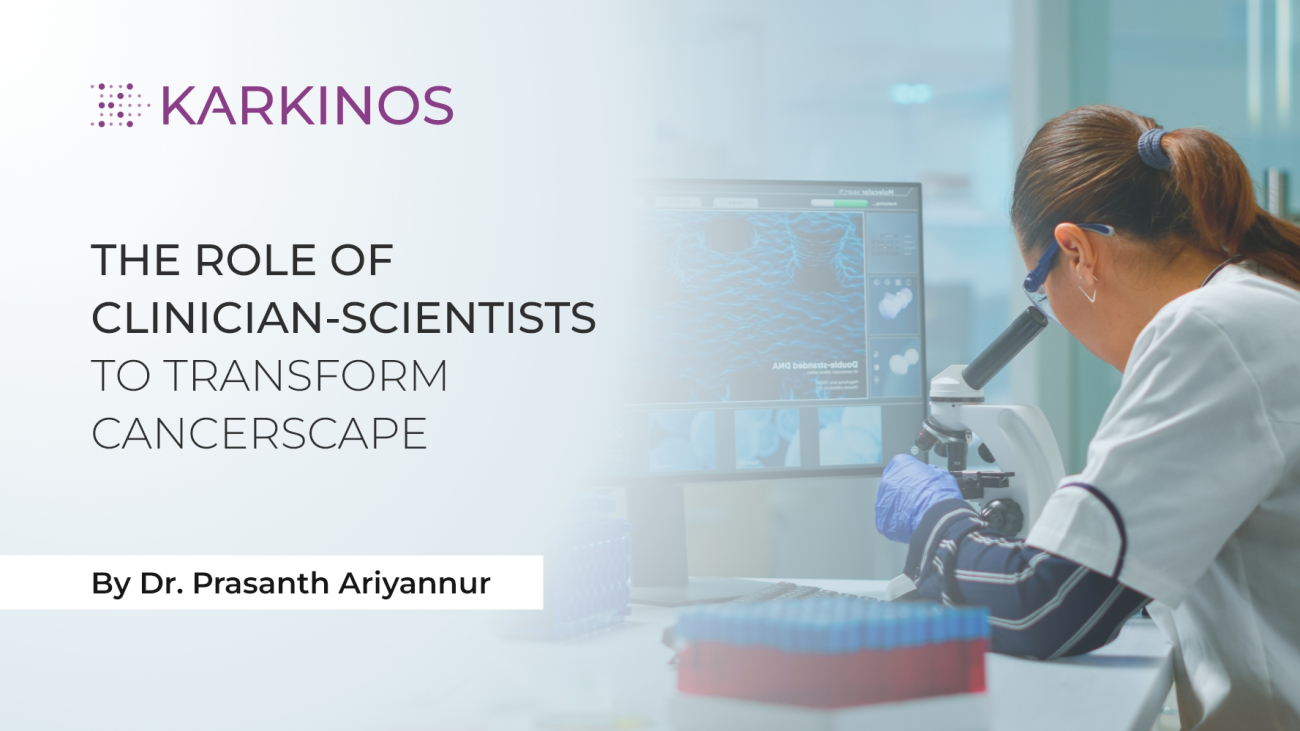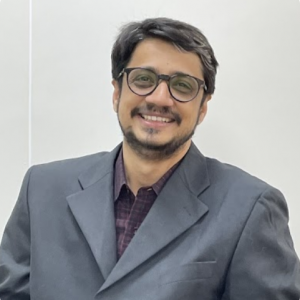Building Bridges in Cancerscape
Dr. Prasanth Ariyannur, Head of the Genomics Laboratory of Karkinos Advanced Center for Cancer Diagnostics and Research
We know that our body always functions on a 24-hour, day-night rhythm. Some call it circadian rhythm; others call it the biological clock. A few years ago, some scientists decided to look at the clock and explore its influence on the effectiveness of cancer chemotherapy.
Specific theoretical and mathematical models were developed. It was then brainstormed too. Subsequently, two preliminary studies conducted on the timing of chemotherapy in brain cancer and breast cancer showed significant results. In both the studies, administering chemotherapeutic agents in the morning had more survival benefits than taking them in the evening.
This led to the discovery of the development of a new treatment method called cancer chronotherapy. This initiated the discovery of the induction of cancer proliferation genes (MYC and TP53) by the circadian rhythm-regulating genes (BMAL1 & CLOCK). These new findings attracted the larger science community for a more detailed examination of the circadian rhythm regulating cancer genes.
Who knew?
Before these events, in the past decade, who knew we could predict the chemotherapeutic efficacy by looking at the timing of chemotherapy administration? The scientists working on circadian rhythm and cancer therapeutics were living in two different and separate worlds, trying to figure out their own solutions to similar questions.
Some mavericks, in this case, a few scientists in INSERM, France, thought of looking at both these worlds, which ultimately led to the correlations, and, more importantly, provided insights on the influence of circadian rhythm in tumor biology. They were precisely making a bridge between those two scientific worlds and got a better view of the cancer landscape or ‘cancerscape’. In this context, it may be interesting to look at where we need bridges in the cancerscape.
While several mountains need to be passed on priority, the biggest one that requires immediate attention is the vast trench between the generation of knowledge in cancer biology and the delivery of effective treatment in cancer care to make meaningful benefits in terms of progression-free and disability-free survival.
In the many years of cancer genome research, new information and data points are being mounted. However, it also led to the understanding of how little we know about what causes cancer at the molecular level. This, perhaps, is the most crucial aspect of its lack of immediate clinical utility of any of this information. On the other hand, clinical utilization can be facilitated with active participation from clinicians. Simply put, clinicians must become clinician-scientists.
Clinician-scientists are the critical group that can bridge the gap between the molecular changes in cancer and its clinical utility in cancer care and management. Improvement in patient care will be much more significant when clinicians start looking at cancer with a scientific temper. They will also start observing subtler changes at the genomic level, contributing to expanding the knowledge of genomics and molecular changes in cancer.
Currently, in India, pathologists and molecular biologists are destined to provide comprehensive diagnoses at the cellular and molecular level of any cancer type to enable treating clinicians to decide on cancer treatments and estimate the likely course of cancer management. Molecular pathology data available today deliver methods and actions to detect early molecular changes in cancers, allowing oncologists to recommend and/or prioritize new targeted cancer therapies for patients.

While molecular scientists and pathologists provide this information, most clinicians, too often, simply take up the information without providing additional input or perspective to the data provided to them.
However, a comprehensive cancer care approach begs to change this classical view of cancer management. It demands a collaborative approach where knowledge is passed back and forth between the Oncologist and Pathologist at every step of the management, not only how the data is handled for every cancer diagnosis at a medical institution but also how the data is generated for subsequent broader utility.
More than being mere passive subscribers of data that is already available in public domains and scientific literature, treating clinicians should actively use their position to participate in the building of knowledge of cancer pathology and overlook the existing method of waiting for the two disciplines to come together as a natural outcome.
Considering the direct role of treating clinicians in managing their patients and the clinical utility of molecular and genomic data, the responsibility of treating clinicians might be greater in generating newer and improved knowledge than a pathologist or a molecular biologist.
More than being mere passive subscribers of data that is already available in public domains and scientific literature, treating clinicians should actively use their position to participate in the building of knowledge of cancer pathology and overlook the existing method of waiting for the two disciplines to come together as a natural outcome.
Let’s discuss specific ways the treating clinicians could get more involved in generating coherent correlations between genomic data and clinical and phenotypic data.
Independent exploration of molecular derangements: The molecular pathologist may be able to determine the cause of cancer through genetic testing and may predict the course of cancer by specifically recommending treatment choices available. However, the clinician, rather than just accepting that interpretation, must take it a step further and explore the molecular changes, correlate it with the patient’s cancer condition, and analyze how the specific set of molecular changes caused cancer in the first place or paved the way to its progression; validate how the treatment progresses while constantly coordinating with the pathologist to retrospect the events from the start to end of treatment.
Longitudinal outlook on molecular derangements in the natural progression of cancer: The genomic variants identified in a comprehensive genomic profile (CGP) are just a snapshot of genomic changes occurring at that particular time of the cancer evolution. The whole range of mutations identified in that snapshot may not make much sense to the whole evolution of cancer at that time point. An inquisitive clinician would note the mutations identified at that point. At a later stage, when cancer progresses or evolves due to specific chemotherapeutic regimes or other management schedules, the variants identified in the CGP done in the previous stage may provide the much-needed perspective of the changes being monitored. To get more clarity on correlations, the treating physicians could discuss this further with the pathologists and molecular biologists to generate newer insights from the previous CGP reports.
Explore the molecular derangements in the early stage of cancer in your patient: Currently, except for a few cancer types, molecular and genomic biomarker screening is done mainly as a late-stage “desperate” hunt for any available therapeutic options. Of course, this is dependent upon the cost-benefit analysis. But one of the significant utilities of molecular and genomic derangements is the early detection of cancers which is discussed in several reviews in PubMed (a recent one is here).
The National Cancer Institute of the USA has provided details on the importance of biomarker testing for cancer treatment. In certain cases, screening cancer biomarkers during the early stage of cancer may not have immediate benefit if the treatments are completely based on currently disseminated guidelines. But from a knowledge point-of-view, the clinicians have a bigger opportunity to get more knowledge on molecular derangements in the early stage of the case. This may, e.g., can be looked at against survival benefits. Early molecular studies would enable clinicians to discover cancer biomarkers tailored to selected clinical and phenotypic categories. In personalized medicine, early biomarkers would have a much more significant impact if they could be correlated with the socioeconomic and lifestyle factors of a particular group of people.
Get more comfortable in handling more information: The cellular and pathological changes themselves seem daunting for a physician to handle while dealing with a cancer patient. So often, the question is how a treating physician can understand and implement the vast amounts of information regarding different signaling pathways in their patient. The answer is very simple, thanks to the current proliferation of knowledge on the internet, a complete knowledge of cancer biology is not warranted. When a new gene mutation or pathway is noted, all the relevant information regarding the function and role in cancer deduced so far is available by simply looking it up in google or any of your favorite search engines. If it is not associated with cancer, its biological function must have been identified.
From this point, questions will arise as to how it is connected to your patient’s cancer. You may be surprised to learn that the answers do not lie as deep as previously thought. If you couldn’t get answers (there are always exceptions to the rule!), please reach out to the scientist who tested your patient’s sample. Perhaps, you may be the first one in the universe to ask that question. Don’t be afraid, as you may be on to something utterly novel that could be the best way to manage that cancer. So go ahead and be bold to take up that new gene name in your report.
Keep documenting, reviewing, and publishing: Perhaps the essential effort might be to record these correlations in a verifiable and retrievable peer-reviewed publication. This is not just for enhancing the professional achievement of the clinician or the pathologist (although that is undoubtedly a favorable off-shoot) but for building the knowledge base that would have high utility for other clinicians and cancer care procedures. Based on that knowledge recorded, newer correlations can be built to expand the knowledge.
We know that no two cancer cases are the same. The approach to treatment differs from patient to patient, which validates the need for collaborative analysis and perspective of cancer diagnosis and treatment. When the clinician starts paying attention to the cancer molecular data, the outcome will result in broader cancer research enabling newer prognostic indicators (molecular markers, data points, and so forth) and cost-effective cancer treatment options personalized or tailor-made. When knowledge strengths and clinical expertise join forces, clinicians will end up developing newer guidelines in cancer care.
When the clinician starts paying attention to the cancer molecular data, the outcome will result in broader cancer research enabling newer prognostic indicators (molecular markers, data points, and so forth) and cost-effective cancer treatment options personalized or tailor-made.
Today, there are set guidelines that are rarely deviated by clinicians. The confidence to deviate from these guidelines will come only when there is validated, research-backed solid evidence that comes by building more evidence-based data, which in turn gets accumulated only when the clinician increasingly collaborates with researchers and pathologists to deduce more correlations between cancer phenotypes at a molecular level and their subsequent treatment outcomes and natural course.
Furthermore, in delivering cancer care, hospitals have a significant role in integrating services. Integration is an important concept many hospitals and clinics have yet to acknowledge. But perhaps from a community health level perspective, the compilation of data collected can help understand the overall delivery of care in any particular center.
Every bit of clinical information provided by the patient, clinical management decisions that were taken and acted on for individual cancer types, and every record of outcomes depicted in that particular patient during the course of treatment should be well-documented and compiled at a center level. A proper Electronic Health Record (EHR) is an invaluable source that can help index, denote, edit, compile, and analyze all the cases that are reviewed in a center. All these could be significant tools for building bridges at a cancer care center level.
The bridging of the gap between basic cancer biology and meaningful clinical utility must be the primary route while creating a road map for long-lasting outcomes in cancer care. This should be the cornerstone for the practice of oncology and cancer medicine.
Apart from the healthcare sector, research institutions should develop graduate-level courses for integrating data. There must be a course on translative capacity focused on assimilating knowledge base to clinical practice, equipping students to attain specific technical skills to look for opportunities for building the bridges between the different knowledge peaks, not only from a data perspective but also creating different forms of the network connecting the peaks of the cancerscape.
The bridging of the gap between basic cancer biology and meaningful clinical utility must be the primary route while creating a road map for long-lasting outcomes in cancer care. This should be the cornerstone for the practice of oncology and cancer medicine.

 About Dr. Prasanth Ariyannur
About Dr. Prasanth Ariyannur